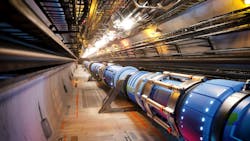World's biggest machine: China's CEPC and CERN's $17 billion FCC could overtake the large hadron collider
Key Highlights
- China's CEPC project is awaiting government approval, with construction potentially beginning in 2027 and completion in a decade.
- CERN's FCC feasibility study indicates the project is technically feasible and could provide critical insights into the Higgs boson and beyond Standard Model physics, with a decision expected around 2028.
While China's technical design report for its proposed circular electron-positron collider (CEPC) is still awaiting government approval for inclusion in the next five-year plan, hope is still strong that construction of the $5.2 billion supercollider could begin as soon as 2027 and be completed in a decade, surpassing CERN's large hadron collider (LHC) as the world's largest machine.
At a dedicated meeting of the CERN Council, delegates from CERN’s member and associate member states reviewed the outcome of the feasibility study for the proposed $17 billion future circular collider (FCC), which could begin construction some time in the 2030s, if approved.
Particle colliders are unique instruments that allow the smallest constituents of matter and the laws of the universe to be studied at the most fundamental level. CERN is looking to identify the next collider that would succeed the LHC after it reaches the end of operations in 2041.
In line with the recommendations of the 2020 update of the European Strategy for Particle Physics (ESPP), CERN conducted the FCC feasibility study, which was undertaken in collaboration with many institutions in CERN’s member and associate member states.
Following review by the CERN Council’s subordinate bodies, the Scientific Policy Committee and the Finance Committee, and by independent expert committees, the Council delegates examined the study report.
The independent expert committees stated that, based on the documentation presented, the FCC appears technically feasible—no showstoppers identified so far.
In its conclusion, the CERN Council considers the FCC would provide the platform for a visionary physics program addressing many of the open questions in particle physics, notably on the Higgs boson, that are critical to understanding the foundations of the Standard Model and to opening up opportunities for discovering new physics beyond the Standard Model, while at the same time driving the development of new technologies that will have a significant positive impact on society.
Get your subscription to Control Design’s daily newsletter.
"The CERN Council reaffirmed its strong wish to maintain CERN as a leader in particle physics and views the continuation of the FCC study as a step toward this goal", said Costas Fountas, president of the CERN Council.
The Council welcomed the CERN Management’s work over the past several years to develop a funding model and financial scenarios based on varying levels of resources that might be available both inside and outside the CERN budget.
The CERN Council concluded that the feasibility study provides the basis for the FCC studies to continue and that the funding scenarios presented and the financial pledges obtained so far provide the basis for the continuation of the work toward securing the full financial commitments required for approval of the FCC project.
"The breadth and depth of the FCC feasibility study are remarkable and were made possible only through the collective effort of around 1,500 people from 162 institutes in 38 countries", said Fabiola Gianotti, director-general of CERN. "The CERN Council conclusions mark a very important milestone for the FCC on the road toward its possible approval."
As part of the ongoing update of the ESPP, a community-driven process, recommendations on CERN’s future flagship project will be developed in December 2025 at a dedicated meeting in Ascona, Switzerland. These and other recommendations will be considered for approval in May 2026, which will mark the conclusion of the process and the update of the ESPP. The FCC feasibility study report is intended to support informed decision-making by CERN member states and does not prejudge any final position. A decision by the CERN Council on the possible construction of the FCC is expected around 2028.

